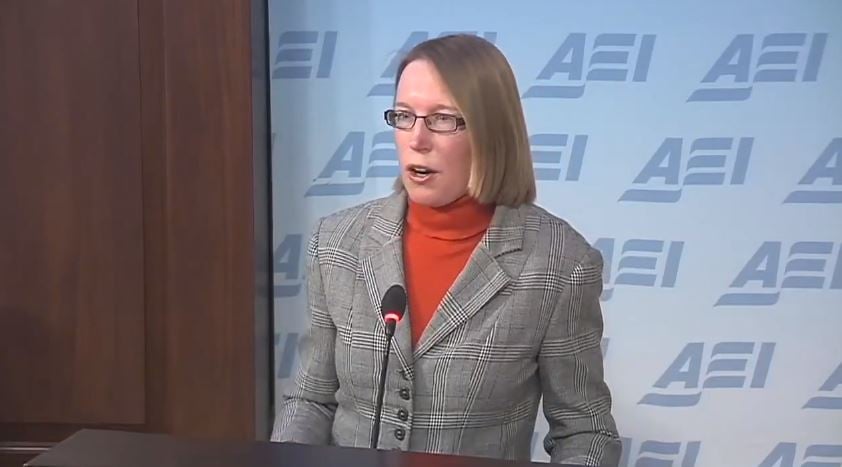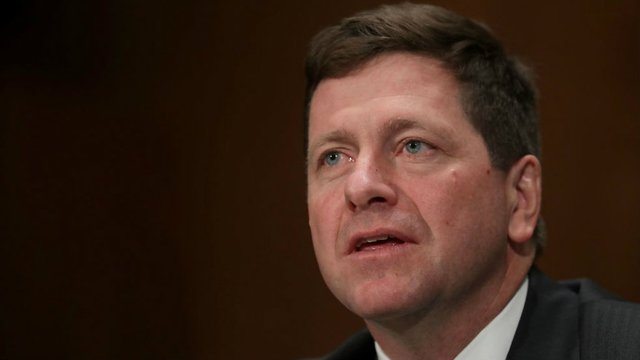‘Arcane’ SEC Rules May Kill Chances of Bitcoin ETF in 2019: Crypto Mom

SEC Commissioner Hester Peirce believes the agency should approve a bitcoin ETF, but she is currently in the minority on this point. | Featured Image from American Enterprise Institute/YouTube
The chance of a Bitcoin exchange-traded fund (ETF) gaining approval this year is slipping away.
Securities and Exchange Commissioner Hester Peirce yet again downplayed the prospect of a Bitcoin ETF on Tuesday. Known as “Crypto Mom” for her unwavering support for bitcoin, she blamed “arcane rules” at the Securities and Exchange Commission (SEC) for the long delay.
Speaking at an event at the Bipartisan Policy Center, she said :
“[W]e have applications. … those are subject to a very specific time frame where we have to act within a certain amount of time, and so that’s what it’s going to depend on. And those are very arcane rules as to whether it happens or not, so I can’t speculate on the timing.”
Crypto Mom: Fighting the Good Fight
Crypto Mom Hester Peirce is a lone bitcoin champion in the SEC. As CCN.com previously reported, she is the progressive voice in a traditionally conservative institution:
“You all know that I am working on trying to convince my colleagues to have a bit more of an open mind when it comes to [crypto].”
She pushed hard for a vote on the much-hyped VanEck and SolidX proposal last year, but the decision was ultimately delayed. As Peirce lamented, the SEC is “impulsive in running away” from bitcoin.
Bitcoin ETF: the catalyst for the next crypto bull run?
The approval of a bitcoin ETF is widely seen as the next major trigger for a price rebound. The ETF would provide institutional investors with an easy way to get exposure to the crypto market.
The SEC rejected multiple ETF applications through 2018, including a proposal from the Winklevoss Twins. The Commission repeatedly cites concerns over manipulation and lack of maturity in the market.
Peirce has fought back, suggesting investors are capable of making up their own minds on bitcoin’s risk.
The best hope for approval currently lies with a proposal from VanEck and SolidX. It derives its price from the bitcoin over the counter (OTC) market, rather than futures markets. OTC markets are much larger and more liquid, giving the application a better chance of approval.
The VanEck Solid X ETF is also “physically settled” which would require the actual purchase of bitcoin to back the ETF.
Unfortunately, the CBOE pulled the application in January due to the government shutdown. The team has now re-submitted the application and will embark on the long journey to approval or rejection.
What will it take to get a Bitcoin ETF approval?
The SEC’s main concern lies with manipulation, theft, and custody of crypto assets. The SEC chairman Jay Clayton offered an insight into his concerns at November’s Consensus event.
“What investors expect is that trading in the commodity that underlies that ETF makes sense and is free from the risk of manipulation. It’s an issue that needs to be addressed before I would be comfortable.”
Despite that, VanEck CEO Jan van Eck is confident. He says VanEck has “pretty solid answers to [SEC questions], but we just need to really demonstrate it very, very clearly and convincingly to the regulators.”

Either way, it will be a long process to battle through the arcane system. The VanEck application has only just been resubmitted, and the SEC can take 180 days to approve or deny. Additionally, they can expand the term to 60 days.
Bitcoin ETF is “virtually certain”
The SEC may keep kicking the can down the road, but an ETF will get approved eventually. As one Wall Street advisor explained this week:
“It’s virtually certain. The only question is when. And I don’t know how soon it will the happen; the SEC has several legitimate thoughtful concerns that the industry has to overcome, and I’m confident that they will, and eventually we will see a bitcoin ETF. And it’s at that stage that I will be much more comfortable recommending that ordinary investors participate.”